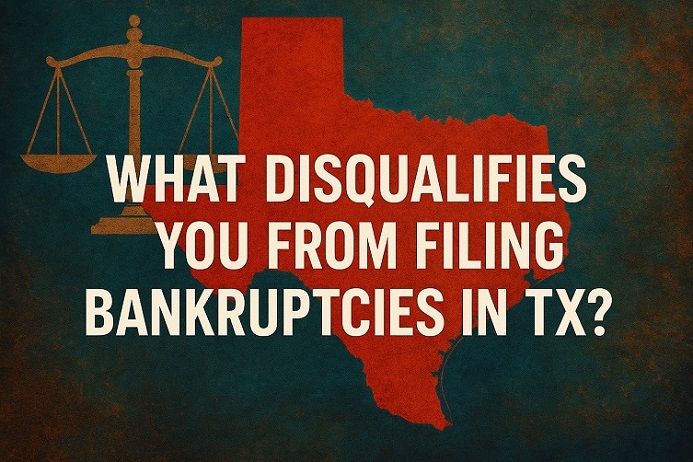Thinking about filing for bankruptcy in Texas? It’s not a guaranteed option for everyone. While bankruptcy offers powerful relief from debt, there are specific legal and financial hurdles that may block your path.
Some filers in Texas are disqualified because they earn too much, own non-exempt assets, or filed too recently. Others may be barred due to fraud, missing required documents, or abusing the court process.
Bankruptcy is governed by federal law, but Texas applies unique rules especially regarding what property you’re allowed to keep and which income thresholds apply. Understanding these differences is critical, especially if you’re relying on bankruptcy to stop a foreclosure, clear medical bills, or protect your home. A single mistake could cost you eligibility, assets, or even your case.
Federal and Texas-Specific Eligibility Rules
Bankruptcy in Texas is shaped by both federal laws and Texas-specific rules, particularly when it comes to what you’re allowed to keep and where you can file. Before diving into disqualifications, it’s important to understand the baseline requirements every filer must meet.
Federal laws determine:
-
The bankruptcy chapters available to individuals and businesses
-
What debts can be discharged
-
Required steps, like credit counseling and filing deadlines
-
Income tests, such as the Chapter 7 means test
Texas rules influence:
-
Exemption laws, which let you protect certain assets like your home, vehicle, or retirement funds from creditors
-
Residency requirements for using those exemptions
-
Local bankruptcy court procedures and case assignments
Key Texas eligibility considerations:
-
To file in Texas, you must have lived in the state for at least 91 of the last 180 days.
-
To use Texas’s generous exemptions (like the unlimited homestead protection), you must have been domiciled in TX for at least 730 days (2 years). Otherwise, you may be forced to use another state’s or the federal exemption list.
-
You must complete credit counseling from an approved provider within 180 days before filing.
These foundational rules don’t guarantee your case will succeed, but failing to meet them can immediately disqualify your case from moving forward.
What Can Disqualify You from Chapter 7 Bankruptcy in Texas
 Chapter 7 is often the fastest path to debt relief—but it comes with strict qualifications. If you’re hoping to eliminate credit card bills, medical debt, or personal loans in Texas, you must meet both federal income requirements and comply with state-level asset protections.
Chapter 7 is often the fastest path to debt relief—but it comes with strict qualifications. If you’re hoping to eliminate credit card bills, medical debt, or personal loans in Texas, you must meet both federal income requirements and comply with state-level asset protections.
Common reasons you may be disqualified from Chapter 7 in Texas:
-
Your income is too high
Texas residents must pass the means test, which compares your income to the state median. If your income is above the threshold and you still have disposable income after allowable expenses, the court may rule you’re capable of repaying debts—disqualifying you from Chapter 7. -
You filed bankruptcy too recently
If you received a Chapter 7 discharge within the past 8 years, or a Chapter 13 discharge in the past 6 years, you may be temporarily barred from filing again. -
You own too many non-exempt assets
While Texas offers some of the most generous exemption laws such as unlimited homestead protection you could still be at risk if you own assets not covered by state exemptions (like second homes, luxury vehicles, or investment accounts). If you refuse to surrender those, the case may be dismissed. -
You committed fraud or acted in bad faith
Hiding assets, transferring property to others to keep it out of the court’s reach, or intentionally omitting income can lead to immediate disqualification and even criminal charges. Texas courts take these issues seriously and often deny discharge if fraud is suspected. -
You can afford to pay your debts
Even if you pass the means test, the trustee or creditors can object to your case if they believe your financial situation shows the ability to repay. This may lead to a forced conversion to Chapter 13 or a full case dismissal.
Chapter 7 is powerful but only if you qualify. It’s often best suited for those with limited income, no significant assets, and unmanageable unsecured debts.
What Can Disqualify You from Chapter 13 Bankruptcy in Texas
Chapter 13 bankruptcy is designed for people who want to keep their assets while repaying debts through a structured plan but not everyone qualifies. Texas filers must meet specific financial criteria, follow strict procedures, and propose a realistic repayment plan to be eligible.
Here’s what might disqualify you from Chapter 13 in Texas:
-
You don’t have a regular income
Chapter 13 is based on your ability to make monthly payments for 3 to 5 years. If your income is irregular, unreliable, or too low to fund the plan, the court may reject your filing outright. -
Your debts exceed the legal limits
As of 2025, your unsecured debt must be under $465,275 and secured debt under $1,395,875. These limits adjust over time. If you owe more than this, you’ll likely need to consider Chapter 11 instead. -
You’ve filed too recently
You must wait 2 years between Chapter 13 discharges and 4 years after a Chapter 7 discharge before receiving another Chapter 13 discharge. If you file too soon, the court can deny your new case. -
You’ve had a prior case dismissed
If your previous Chapter 13 was dismissed due to missed payments, incomplete paperwork, or failure to appear in court, you may face a 180-day waiting period before you can refile. -
Your repayment plan isn’t feasible
The court will review your proposed plan to ensure it complies with legal standards and realistically fits your income. If your plan is underfunded, doesn’t account for priority debts, or lacks documentation, the court can reject it.
While Chapter 13 gives you more flexibility than Chapter 7, it still requires a clear financial strategy and full transparency. Working with a Texas bankruptcy lawyer can help you avoid these pitfalls and file a plan the court is likely to approve.
Actions That May Lead to Bankruptcy Dismissal or Denial in TX
Even if you meet all the basic requirements for Chapter 7 or Chapter 13, certain actions can still cause your case to be dismissed or your discharge denied by a Texas bankruptcy court. These are often based on behavior during the filing process or violations of court rules.
Here are common reasons bankruptcy cases get dismissed or denied in Texas:
-
Missing required courses
Before filing, you must complete a credit counseling course, and after filing, a debtor education course. Failing to complete either on time can result in automatic dismissal even if all other paperwork is in order. -
Incomplete or inaccurate paperwork
Bankruptcy requires full disclosure of all income, assets, debts, and financial transactions. If your paperwork is missing forms, contains errors, or fails to disclose key details, the court can dismiss your case or delay your discharge. -
Transferring or hiding assets
Attempting to move money, vehicles, property, or other assets to friends or family before filing is a serious red flag. This type of action is viewed as fraud, and the court may not only dismiss your case but also pursue penalties. -
Multiple filings in short time frames
If you’ve filed bankruptcy more than once in a short period, especially if earlier cases were dismissed, you may be barred from refiling for 180 days or longer. Courts may view repeat filings as a misuse of the process. -
Abuse of the bankruptcy system
If the court finds you’re using bankruptcy in bad faith such as filing just to delay foreclosure or collections with no intent to follow through it can deny your discharge altogether under 11 U.S.C. § 727 or § 1307.
Being truthful, timely, and complete is essential. In Texas, bankruptcy courts have little tolerance for abuse, and missteps even accidental ones can cost you your chance at relief.
FAQs About Bankruptcy Disqualifications in TX
What is the income limit to file Chapter 7 in Texas?
The income limit depends on your household size. For example, as of 2025, a single filer must earn below roughly $61,000 per year to automatically qualify. If your income is higher, you must pass a second part of the means test that factors in living expenses.
Can I be denied bankruptcy in Texas for owning too many assets?
Yes. While Texas offers generous protections like the unlimited homestead exemption, some assets—like luxury vehicles, vacation homes, or investment property—may not be protected. If you refuse to surrender non-exempt assets, the court may dismiss your case or deny your discharge.
How long do I have to wait between bankruptcy filings in TX?
It depends on the type of bankruptcy:
-
Chapter 7 → Chapter 7: 8 years
-
Chapter 13 → Chapter 13: 2 years
-
Chapter 7 → Chapter 13: 4 years
-
Chapter 13 → Chapter 7: 6 years
These timelines are based on the date of discharge, not the filing date.
Will hiding assets disqualify me from bankruptcy?
Absolutely. Hiding property, income, or financial transfers is considered fraud and can lead to immediate case dismissal, denial of discharge, and even federal criminal charges.
Can a Texas bankruptcy court reject my filing?
Yes. If you don’t meet eligibility requirements, fail to complete courses, omit critical information, or abuse the process, the court can deny your discharge or throw out your case entirely.
Not Sure If You Qualify? Talk to a Texas Bankruptcy Attorney
Bankruptcy law offers a path to financial relief but only if you meet the requirements. Disqualifications can arise from income limits, prior filings, or honest mistakes. If you’re unsure whether you qualify to file Chapter 7 or Chapter 13 in Texas, the best thing you can do is speak to a knowledgeable Texas bankruptcy attorney.
An attorney can help you avoid common pitfalls, protect your property, and make sure your case is handled correctly from the start. Don’t risk dismissal get clear, personalized advice before you file.
